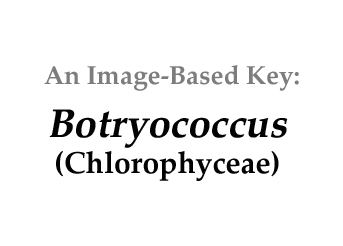|
|
||||
|
|
||||
|
|
||||
|
Click on images for larger format |
||||
Name derivation:
|
||||
|
“Coccoid cluster” – Cluster Botryo- coccoid –coccus |
||||
Classification:
|
||||
Botryococcus Kützing
1849; 12 of 15 species descriptions
are currently accepted taxonomically (Guiry and Guiry 2013).
Order Trebouxiales; Family Botryococcaceae |
||||
Morphology:
|
||||
|
Non-flagellated
compact colony with cells embedded in a wax-like substance that tends to hide
cellular organelles from view, often masking chlorophyll with orange-red
carotinoid pigments. Thin filaments connect the cells. The cell body is 6 to
10 μm long, and 3 to 6 μm wide. |
||||
Similar genera:
|
||||
|
|
||||
Habitat:
|
||||
|
Mostly found in freshwater environments. Inland,
shallow and oxygenated freshwater lakes, ponds, pools or slow moving waters
plus ditches, bogs. They grow in oligotrophic lakes but prefer a eutrophic
environment with a slightly acidic pH level. The salinity of the lakes they
inhibit is usually less than 5%. Oil
and wax production increases buoyancy (by decreasing specific gravity of the colony), occasionally causing floatation of large masses on the surface of lakes.
|
||||
|
Toxicity: |
||||
|
Cell-free
extract from eutrophic Liyu Lake (eastern Taiwan) was found to be toxic to
several species of phytoplankton and zooplankton. During blooms of Botryococcus braunii the
relative dominance of 20 phytoplankton species isolated from Liyu Lake
and cultered, was inversely related to their susceptibility to the extract,
suggesting that B. braunii
influences the phytoplankton community composition. Among zooplankton, copepods were more
susceptible to the extract than cladocerans. The
cell-free extract of several phytoplankton species contained four fatty acids The
alkaline pH (8-9) of Liyu Lake during B.
braunii blooms is thought to have enhanced the toxicity of the cell-free
fatty acids (Ibid 2004). |
||||
References:
|
||||
|
Chiang,
I-Z., W-Y. Huang, and J-T. Wu
2004. Allelochemicals of Botryococcus braunii (Chlorophyceae). J. Phycol. 40:474-480. Guiry, M.D. and G.M.
Guiry 2013. AlgaeBase. World-wide electronic publication, National
University of Ireland, Galway. http://www.algaebase.org; searched on 15
September 2013. Patterson, D.J. 1996. Free-Living Freshwater Protozoa. John Wiley & Sons, Inc. Kützing,
F.T. 1849. Species algarum. pp. [i]-vi,
[1]-922. Lipsiae [Leipzig]: F.A. Brockhaus. National lnstitute of Marine Geology and Geo-ecology of Romania Proc. lntern. Workshop on "Modern and Ancient Sedimentary Environments and Processes" in Moeciu, Romania, Oct. 8-15, 1998 |
||||















